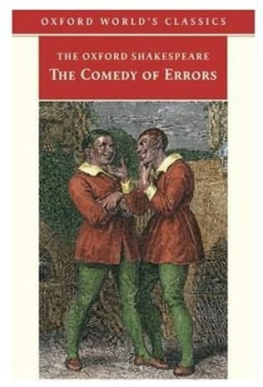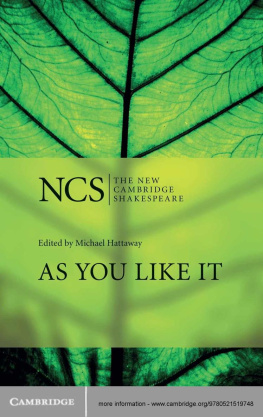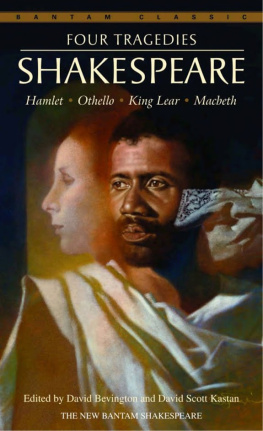William Shakespeare - The Comedy of Errors
Here you can read online William Shakespeare - The Comedy of Errors full text of the book (entire story) in english for free. Download pdf and epub, get meaning, cover and reviews about this ebook. publisher: Project Gutenberg, genre: Art. Description of the work, (preface) as well as reviews are available. Best literature library LitArk.com created for fans of good reading and offers a wide selection of genres:
Romance novel
Science fiction
Adventure
Detective
Science
History
Home and family
Prose
Art
Politics
Computer
Non-fiction
Religion
Business
Children
Humor
Choose a favorite category and find really read worthwhile books. Enjoy immersion in the world of imagination, feel the emotions of the characters or learn something new for yourself, make an fascinating discovery.
- Book:The Comedy of Errors
- Author:
- Publisher:Project Gutenberg
- Genre:
- Rating:5 / 5
- Favourites:Add to favourites
- Your mark:
- 100
- 1
- 2
- 3
- 4
- 5
The Comedy of Errors: summary, description and annotation
We offer to read an annotation, description, summary or preface (depends on what the author of the book "The Comedy of Errors" wrote himself). If you haven't found the necessary information about the book — write in the comments, we will try to find it.
The Comedy of Errors — read online for free the complete book (whole text) full work
Below is the text of the book, divided by pages. System saving the place of the last page read, allows you to conveniently read the book "The Comedy of Errors" online for free, without having to search again every time where you left off. Put a bookmark, and you can go to the page where you finished reading at any time.
Font size:
Interval:
Bookmark:
[Enter the DUKE, AEGEON, GAOLER, OFFICERS, and other ATTENDANTS.]
AEGEON.
Proceed, Solinus, to procure my fall,
And, by the doom of death, end woes and all.
DUKE.
Merchant of Syracuse, plead no more;
I am not partial to infringe our laws:
The enmity and discord which of late
Sprung from the rancorous outrage of your duke
To merchants, our well-dealing countrymen,
Who, wanting guilders to redeem their lives,
Have seal'd his rigorous statutes with their bloods,
Excludes all pity from our threat'ning looks.
For, since the mortal and intestine jars
'Twixt thy seditious countrymen and us,
It hath in solemn synods been decreed,
Both by the Syracusians and ourselves,
To admit no traffic to our adverse towns;
Nay, more,
If any born at Ephesus be seen
At any Syracusian marts and fairs;
Again, if any Syracusian born
Come to the bay of Ephesus, he dies,
His goods confiscate to the Duke's dispose;
Unless a thousand marks be levied,
To quit the penalty and to ransom him.
Thy substance, valued at the highest rate,
Cannot amount unto a hundred marks:
Therefore by law thou art condemn'd to die.
AEGEON.
Yet this my comfort,when your words are done,
My woes end likewise with the evening sun.
DUKE.
Well, Syracusan, say, in brief, the cause
Why thou departedst from thy native home,
And for what cause thou cam'st to Ephesus.
AEGEON.
A heavier task could not have been impos'd
Than I to speak my griefs unspeakable!
Yet, that the world may witness that my end
Was wrought by nature, not by vile offence,
I'll utter what my sorrow gives me leave.
In Syracuse was I born; and wed
Unto a woman, happy but for me,
And by me too, had not our hap been bad.
With her I liv'd in joy; our wealth increas'd
By prosperous voyages I often made
To Epidamnum, till my factor's death,
And he,great care of goods at random left,
Drew me from kind embracements of my spouse:
From whom my absence was not six months old,
Before herself,almost at fainting under
The pleasing punishment that women bear,
Had made provision for her following me,
And soon and safe arrived where I was.
There had she not been long but she became
A joyful mother of two goodly sons;
And, which was strange, the one so like the other
As could not be disdnguish'd but by names.
That very hour, and in the self-same inn,
A mean woman was delivered
Of such a burden, male twins, both alike:
Those,for their parents were exceeding poor,
I bought, and brought up to attend my sons.
My wife, not meanly proud of two such boys,
Made daily motions for our home return:
Unwilling I agreed; alas! too soon!
We came aboard:
A league from Epidamnum had we sail'd
Before the always-wind-obeying deep
Gave any tragic instance of our harm;
But longer did we not retain much hope:
For what obscured light the heavens did grant
Did but convey unto our fearful minds
A doubtful warrant of immediate death;
Which though myself would gladly have embrac'd,
Yet the incessant weepings of my wife,
Weeping before for what she saw must come,
And piteous plainings of the pretty babes,
That mourn'd for fashion, ignorant what to fear,
Forc'd me to seek delays for them and me.
And this it was,for other means was none.
The sailors sought for safety by our boat,
And left the ship, then sinking-ripe, to us;:
My wife, more careful for the latter-born,
Had fast'ned him unto a small spare mast,
Such as sea-faring men provide for storms:
To him one of the other twins was bound,
Whilst I had been like heedful of the other.
The children thus dispos'd, my wife and I,
Fixing our eyes on whom our care was fix'd,
Fast'ned ourselves at either end the mast,
And, floating straight, obedient to the stream,
Were carried towards Corinth, as we thought.
At length the sun, gazing upon the earth,
Dispers'd those vapours that offended us;
And, by the benefit of his wish'd light,
The seas wax'd calm, and we discover'd
Two ships from far making amain to us,
Of Corinth that, of Epidaurus this:
But ere they cameO, let me say no more!
Gather the sequel by that went before.
DUKE.
Nay, forward, old man, do not break off so;
For we may pity, though not pardon thee.
AEGEON.
O, had the gods done so, I had not now
Worthily term'd them merciless to us!
For, ere the ships could meet by twice five leagues,
We were encount'red by a mighty rock,
Which being violently borne upon,
Our helpful ship was splitted in the midst;
So that, in this unjust divorce of us,
Fortune had left to both of us alike
What to delight in, what to sorrow for.
Her part, poor soul! seeming as burdened
With lesser weight, but not with lesser woe,
Was carried with more speed before the wind;
And in our sight they three were taken up
By fishermen of Corinth, as we thought.
At length another ship had seiz'd on us;
And, knowing whom it was their hap to save,
Gave healthful welcome to their ship-wreck'd guests;
And would have reft the fishers of their prey,
Had not their bark been very slow of sail,
And therefore homeward did they bend their course.
Thus have you heard me sever'd from my bliss;
That by misfortunes was my life prolong'd,
To tell sad stories of my own mishaps.
DUKE.
And, for the sake of them thou sorrowest for,
Do me the favour to dilate at full
What have befall'n of them and thee till now.
AEGEON.
My youngest boy, and yet my eldest care,
At eighteen years became inquisitive
After his brother, and importun'd me
That his attendant,so his case was like,
Reft of his brother, but retain'd his name,
Might bear him company in the quest of him:
Whom whilst I laboured of a love to see,
I hazarded the loss of whom I lov'd.
Five summers have I spent in furthest Greece,
Roaming clean through the bounds of Asia,
And, coasting homeward, came to Ephesus;
Hopeless to find, yet loath to leave unsought
Or that or any place that harbours men.
But here must end the story of my life;
And happy were I in my timely death,
Could all my travels warrant me they live.
DUKE.
Hapless Aegeon, whom the fates have mark'd
To bear the extremity of dire mishap!
Now, trust me, were it not against our laws,
Against my crown, my oath, my dignity,
Which princes, would they, may not disannul,
My soul should sue as advocate for thee.
But though thou art adjudged to the death,
And passed sentence may not be recall'd
But to our honour's great disparagement,
Yet will I favour thee in what I can:
Therefore, merchant, I'll limit thee this day
To seek thy help by beneficial help:
Try all the friends thou hast in Ephesus:
Beg thou, or borrow, to make up the sum,
And live; if not, then thou art doom'd to die.
Gaoler, take him to thy custody.
GAOLER.
I will, my lord.
AEGEON.
Hopeless and helpless doth Aegeon wend.
But to procrastinate his lifeless end.
[Exeunt.]
[Enter ANTIPHOLUS and DROMIO OF SYRACUSE, and a MERCHANT.]
MERCHANT.
Therefore, give out you are of Epidamnum,
Lest that your goods too soon be confiscate.
This very day a Syracusian merchant
Is apprehended for arrival here;
And, not being able to buy out his life,
According to the statute of the town,
Dies ere the weary sun set in the west.
There is your money that I had to keep.
ANTIPHOLUS OF SYRACUSE.
Go bear it to the Centaur, where we host,
And stay there, Dromio, till I come to thee.
Font size:
Interval:
Bookmark:
Similar books «The Comedy of Errors»
Look at similar books to The Comedy of Errors. We have selected literature similar in name and meaning in the hope of providing readers with more options to find new, interesting, not yet read works.
Discussion, reviews of the book The Comedy of Errors and just readers' own opinions. Leave your comments, write what you think about the work, its meaning or the main characters. Specify what exactly you liked and what you didn't like, and why you think so.














